 |
Photos:
Delegates from Cuba (right) and 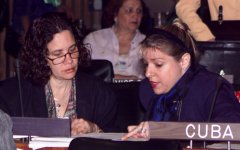 Syrian Arab Republic (left) and Lesotho (bottom right)
Syrian Arab Republic (left) and Lesotho (bottom right)
On creating
and maintaining a non-discriminatory, as well as a gender sensitive
legal environment by reviewing legislation with the view to
striving to remove discriminatory provision, delegates debated
the time frame to removing removing them. SADC countries
and others opposed reference to as soon as possible and supported
removal by 2005. SLAC, the EU, LIBYA, SADC, SUDAN, CUBA,
TUNISIA, EGYPT accepted language on striving for removal
by 2005. PAKISTAN opposed the reference. Sudan
proposed to removing them as soon as possible, preferably by
2005, and the text was agreed. Regarding reviewing all existing
legislation and policy to ensure their compatibility and compliance
with the provisions of CEDAW and other relevant 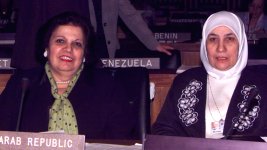 international
human rights instruments as well as ensure that future legislation
is also designed accordingly, some delegates, including Libya
and Sudan, noted this as a heavy burden on countries and
supported a qualifier on such as consider reviewing or reviewing
as appropriate. Working Group II adopted: 53 bis, on
addressing the concerns of girls and women with disabilities
in policy making and programming; 107(a), on policies and measures
to address health challenges; 107(g), on adopting, inter alia,
and implementing health legislation, policies and programmes
in consultation with women's organizations; 107(g) quarter,
on men's sexual and reproductive behavior; 107(j) bis, on substance
abuse; 115(g), on social services and support to pregnant adolescents;
132(f), on protecting, inter alia, individuals engaged in promoting
women's humanrights;
132(g), on gender perspectives in treaty body reports; international
human rights instruments as well as ensure that future legislation
is also designed accordingly, some delegates, including Libya
and Sudan, noted this as a heavy burden on countries and
supported a qualifier on such as consider reviewing or reviewing
as appropriate. Working Group II adopted: 53 bis, on
addressing the concerns of girls and women with disabilities
in policy making and programming; 107(a), on policies and measures
to address health challenges; 107(g), on adopting, inter alia,
and implementing health legislation, policies and programmes
in consultation with women's organizations; 107(g) quarter,
on men's sexual and reproductive behavior; 107(j) bis, on substance
abuse; 115(g), on social services and support to pregnant adolescents;
132(f), on protecting, inter alia, individuals engaged in promoting
women's humanrights;
132(g), on gender perspectives in treaty body reports; 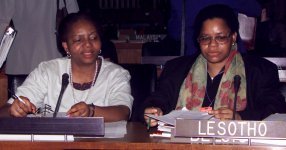 135(d),
on poverty eradication programmes, including a Philippines'
amendment to refer to physical and mental health care; 135(f),
on supporting the Cologne initiative, particularly the speedy
implementation of the enhanced HIPC; and 138(d), on access to
adequate and affordable, inter alia, treatment for all people.
Delegates agreed to 133(m) bis, on disarmament, with SLAC
proposals including deletion of a reference to the PFA. They
accepted Cuba's proposed 133(m) ter, on generating financial
resources through appropriate reduction of excessive military
expenditures, with EU amendments including text on the
arms trade and investment for arms production and acquisition.
In 134(a), on the media and information industry, SLAC, with
JUSCANZ and the EU, reiterated its support for a bracketed
reference to freedom of expression. The HOLY SEE and LIBYA
opposed, and the reference remains bracketed. 135(d),
on poverty eradication programmes, including a Philippines'
amendment to refer to physical and mental health care; 135(f),
on supporting the Cologne initiative, particularly the speedy
implementation of the enhanced HIPC; and 138(d), on access to
adequate and affordable, inter alia, treatment for all people.
Delegates agreed to 133(m) bis, on disarmament, with SLAC
proposals including deletion of a reference to the PFA. They
accepted Cuba's proposed 133(m) ter, on generating financial
resources through appropriate reduction of excessive military
expenditures, with EU amendments including text on the
arms trade and investment for arms production and acquisition.
In 134(a), on the media and information industry, SLAC, with
JUSCANZ and the EU, reiterated its support for a bracketed
reference to freedom of expression. The HOLY SEE and LIBYA
opposed, and the reference remains bracketed.
|
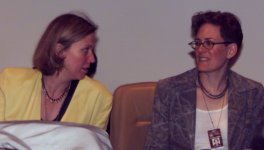 Working
Group I: ENB writer Gretchen Sidhu speaks with a representative
of the European Union. The EU, supported by CARICOM and SADC ,
proposed a reformulation of text stating that failure to recognize
and measure, in quantitative terms, unremunerated work of women,
which is often not valid in national accounts, has meant that
women's full contribution to social and economic development remains
underestimated. The EU text was agreed. Working
Group I: ENB writer Gretchen Sidhu speaks with a representative
of the European Union. The EU, supported by CARICOM and SADC ,
proposed a reformulation of text stating that failure to recognize
and measure, in quantitative terms, unremunerated work of women,
which is often not valid in national accounts, has meant that
women's full contribution to social and economic development remains
underestimated. The EU text was agreed. 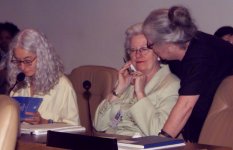 Delegates
endorsed text on forms of abuse, including, inter alia, inadequate
working conditions, economic and sexual exploitation, and racism.
The PHILIPPINES proposed, while BANGLADESH and SUDAN opposed,
deleting reference to forced prostitution. Noting implied reference
under sexual exploitation, delegates agreed to its deletion. EGYPT
proposed, with MEXICO and NIGERIA, language on forms of abuse
which impair enjoyment of human rights "and in some cases" constitute
violations of human rights, and the paragraph was agreed as amended. Delegates
endorsed text on forms of abuse, including, inter alia, inadequate
working conditions, economic and sexual exploitation, and racism.
The PHILIPPINES proposed, while BANGLADESH and SUDAN opposed,
deleting reference to forced prostitution. Noting implied reference
under sexual exploitation, delegates agreed to its deletion. EGYPT
proposed, with MEXICO and NIGERIA, language on forms of abuse
which impair enjoyment of human rights "and in some cases" constitute
violations of human rights, and the paragraph was agreed as amended.
JUSCANZ
|
|
Panel
Discussion: "Dialogue between NGOs and Governments:
For a Gender Sensitive Citizenship"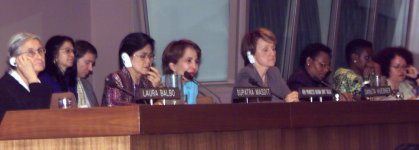
The
UN Regional Commissions organized a panel discussion on "dialogue
between NGOs and Governments: for a gender sensitive citizenship."
Participants discussed, inter alia, NGOs' key role in pushing the
Beijing agenda forward, raise awareness and denounce gender-based
discrimination. They highlighted the necessity to take into consideration
the diversity of different regions and noted that although governments
have come to value issues of women empowerment since Beijing, the
meaning of women citizenship must still be taken beyond a mere status
and toward action. 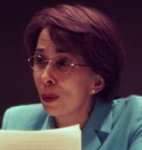
Panel (Left
to right): Laura Balbo (Italy), Supartra Masdit (Thailand), Princess
Basma Bint Talal (Jordan), Danuta Hubner, ECE, Christine Kapalata
(PrepCom Chair), Winnie Byanyima (Uganda) and Gina Vargas (Peru)
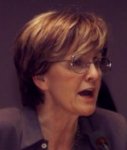 Danuta
Hubner, Executive Secretary, Economic Commission for Europe (left),
chaired the panel discussion. Christine Kapalata, PrepCom
Bureau Chair, said Regional Commissions are in a unique position
to offer a dialogue between governments and civil society and called
for benchmarks, monitoring and synergies. H.E Princess Basma
Bint Talal of Jordan (right) spoke on the evolution of the role
of NGOs in assuring social equity. She noted dialogue in the area
of gender is most controversial. Laura Balbo, President of the
Italian College of Sociologists (ECE), highlighted the importance
of dialogue and gender-sensitive citizenship. She outlined actions
undertaken by NGOs in Europe, including in the areas of labor, health
and immigration at the local level, and in dealing with debt relief,
land mines, and international development and cooperation at the
international level. Winnie Byanyima, Member of Parliament in
Uganda (ECA), noted that since Beijing, African women have ceased
to think of themselves as objects of the State and have taken civic
participation beyond voting. Supatra Masdit, Thai Minister in
charge of the national machinery for the advancement of women
(ESCAP), stated that NGOs have played a critical role in
publicizing the critical role of women in the Asian economic expansion.
Gina Vargas, Latin American Coordinator for the NGO Forum IV
World Conference on Women at Beijing (ECLAC), said that,
even in the light of progress, there is a democratic deficiency
in Latin American countries. She highlighted the paradox of democracy
and poverty. Danuta
Hubner, Executive Secretary, Economic Commission for Europe (left),
chaired the panel discussion. Christine Kapalata, PrepCom
Bureau Chair, said Regional Commissions are in a unique position
to offer a dialogue between governments and civil society and called
for benchmarks, monitoring and synergies. H.E Princess Basma
Bint Talal of Jordan (right) spoke on the evolution of the role
of NGOs in assuring social equity. She noted dialogue in the area
of gender is most controversial. Laura Balbo, President of the
Italian College of Sociologists (ECE), highlighted the importance
of dialogue and gender-sensitive citizenship. She outlined actions
undertaken by NGOs in Europe, including in the areas of labor, health
and immigration at the local level, and in dealing with debt relief,
land mines, and international development and cooperation at the
international level. Winnie Byanyima, Member of Parliament in
Uganda (ECA), noted that since Beijing, African women have ceased
to think of themselves as objects of the State and have taken civic
participation beyond voting. Supatra Masdit, Thai Minister in
charge of the national machinery for the advancement of women
(ESCAP), stated that NGOs have played a critical role in
publicizing the critical role of women in the Asian economic expansion.
Gina Vargas, Latin American Coordinator for the NGO Forum IV
World Conference on Women at Beijing (ECLAC), said that,
even in the light of progress, there is a democratic deficiency
in Latin American countries. She highlighted the paradox of democracy
and poverty.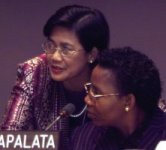
Economic
Commission for Africa (ECA) www.un.org/Depts/eca,
Economic Commission for Europe (ECE) www.unece.org,
Economic Commission for Latin America and the Caribbean (ECLAC)
www.eclac.cl, Economic and
Social Commission for Asia and the Pacific (ESCAP) www.unescap.org,
and Economic Commission for Western Asia (ESCWA) www.escwa.org.lb
Photo
on right: Supartra
Masdit, Thailand and Christine Kapalata, PrepCom Chair
|
 Panel
Discussion: Engendering Peace Processes: Emerging Challenges and
Opportunities Panel
Discussion: Engendering Peace Processes: Emerging Challenges and
Opportunities
This
panel, sponsored by UNIFEM with UNDP and International Alert,
reviewed women's growing participation in peace negotiation and
reconstruction processes in war zones and conflict regions globally.
Panelists included Amy Smythe, Former Minster of Women and
Children's Affairs, Sierra Leone (right), Luz Mendez, General
Coordinator, Guatemala National Union (bottom 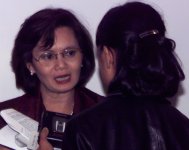 right)
and Mu Sochua, Minster of Women's and Veterans' Affairs, Cambodia
(left). They discussed their roles in sustaining and rebuilding
their nations and communities during and after war. Topics covered
included the need to promote and protect women's human rights
during armed conflict, how women's concerns are integrated into
post conflict peace building efforts, and the advantages of bringing
women's perspectives to peace talks, a process predominantly controlled
by men. Despite strong recognition within the Beijing Platform
for Action for strengthening women's participation at all levels
of peace making processes, women continue to be marginalized from
peace negotiating tables. This panel will draw attention to a
range of ongoing initiatives in support of women's participation
in peace processes. right)
and Mu Sochua, Minster of Women's and Veterans' Affairs, Cambodia
(left). They discussed their roles in sustaining and rebuilding
their nations and communities during and after war. Topics covered
included the need to promote and protect women's human rights
during armed conflict, how women's concerns are integrated into
post conflict peace building efforts, and the advantages of bringing
women's perspectives to peace talks, a process predominantly controlled
by men. Despite strong recognition within the Beijing Platform
for Action for strengthening women's participation at all levels
of peace making processes, women continue to be marginalized from
peace negotiating tables. This panel will draw attention to a
range of ongoing initiatives in support of women's participation
in peace processes.
UNIFEM
has been involved
in the following: Women at the Peace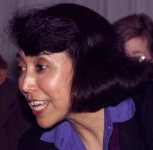 Table: Making a Difference, a UNIFEM publication that has
generated a number of global recommendations for bringing women
to the table; The Millennium Peace Prize for Women,
a joint UNIFEM and International Alert initiative to provide
recognition of significant contributions women have made to securing
peace in their countries and communities; and Gender and Peacekeeping
Table: Making a Difference, a UNIFEM publication that has
generated a number of global recommendations for bringing women
to the table; The Millennium Peace Prize for Women,
a joint UNIFEM and International Alert initiative to provide
recognition of significant contributions women have made to securing
peace in their countries and communities; and Gender and Peacekeeping
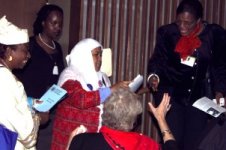 Operations,
the results of a joint study by UN Department of Peacekeeping
Operations and the Division of the Advancement of Women to review
lessons learned on integrating gender issues into peacekeeping
operations. For more information email: unifem@undp.org
or visit: www.unifem.undp.org Operations,
the results of a joint study by UN Department of Peacekeeping
Operations and the Division of the Advancement of Women to review
lessons learned on integrating gender issues into peacekeeping
operations. For more information email: unifem@undp.org
or visit: www.unifem.undp.org
|

 ENB Summary of CSW-44 and the Informal
Consultations
ENB Summary of CSW-44 and the Informal
Consultations
 Linkages FWCW page
Linkages FWCW page
 UN Division for the Advancement of Women Beijing +5 Site with official
documents and information
for participants
UN Division for the Advancement of Women Beijing +5 Site with official
documents and information
for participants
 Special
Events during the Special Session
Special
Events during the Special Session

|